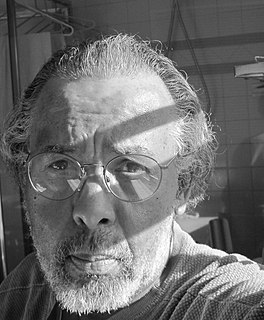A Quote by C. S. Lewis
I would not know how to advise a man how to write. It is a matter of talent and interest. I believe he must be strongly moved if he is to become a writer.
Related Quotes
I would say if a man is going to write on chemistry, he learns chemistry. The same is true of Christianity. But to speak of the craft itself, I would not know how to advise a man how to write. It is a matter of talent and interest. I believe he must be strongly moved if he is to become a writer. Writing is like a 'lust,' or like 'scratching when you itch.' Writing comes as a result of a very strong impulse, and when it does come, I for one must get it out.
In short, there are mysteries of science and of soul that will never be understood no matter how hard we measure, no matter how strongly we believe, no matter how deep our think tanks and how high our aspirations. But as anyone will tell you—for we all know this within our hearts—the impossible happens and grand cosmic mysteries are solved on a regular basis, although most of the time the solutions lead to even greater mysteries.
I would eventually leave the business in 1999 to work full-time as a writer, but during the previous decade, I would advise French businessmen on how to succeed in Germany; tell Americans what to do in Eastern Europe; show the Spanish how to become more like the Americans. I spent one particularly haunting year advising bankers in Mexico.
I met a young woman the other day, and she said, what advice would you have for a writer, and I said it would be to work every day... Your job is to write. The rest of it will take care of itself. But, generally, it seems ... you know how that is, you meet people and they have a talent for self-promotion. Those are the pushy people. And you know their writing's not going to be any good, because that's not their talent.
If you're going to be a writer you should sit down and write in the morning, and keep it up all day, every day. Charles Bukowski, no matter how drunk he got the night before or no matter how hungover he was, the next morning he was at his typewriter. Every morning. Holidays, too. He'd have a bottle of whiskey with him to wake up with, and that's what he believed. That's the way you became a writer: by writing. When you weren't writing, you weren't a writer.
When I was thinking about these women characters, no matter how bad a person I am - a bad writer, my limitations, my sexism, you know - the thought was, it would be useful as a writer to try to create a template for all the male writers, especially Dominican male writers, especially males of color, of how a writer can use seeing to create more nuanced representations of women.
Complaisance, though in itself it be scarce reckoned in the number of moral virtues, is that which gives a lustre to every talent a man can be possessed of. It was Plato's advice to an unpolished writer that he should sacrifice to the graces. In the same manner I would advise every man of learning, who would not appear in the world a mere scholar or philosopher, to make himself master of the social virtue which I have here mentioned.
In the interest of the ethical and moral health of the country, the writer, the poet, the artist, the thinker, must hold a mirror up his or her country and say, look, this is who we are, this is how we live, this is our past, we must own it, forgive ourselves, transcend our transgressions, and become better people. Turning the tide must be a continuous effort.
Editing should be, especially in the case of old writers, a counselling rather than a collaborating task. The tendency of the writer-editor to collaborate is natural, but he should say to himself, 'How can I help this writer to say it better in his own style?' and avoid 'How can I show him how I would write it, if it were my piece?'



































